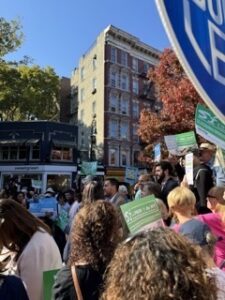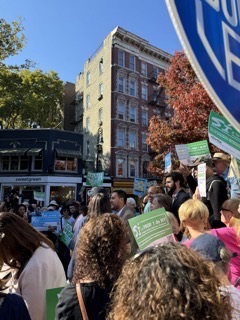
In June of 1969, across the nation, all eyes were on the LGBTQ+ rioters outside Stonewall Inn. Police barricaded the bar while protesters fought back. It was intense. It was fierce. It was the start of the gay liberation movement.
Fifty-five years later, New York is experiencing somewhat of a déjà vu. Just blocks away from Stonewall, at Father Demo Square, a crowd gathered for yet another rally.
“YES ON?” yelled Manhattan Borough President Mark Levine.
“PROP One!” the crowd replied.
“YES ON?”
“PROP One!”
This was the go-to chant at Sunday’s Proposition 1 rally. The event itself was contained and peaceful — in fact, the rest of the park continued undisturbed with their bench reads and midday bagels. But half a century after the Stonewall riots, New York is facing yet another equal rights battle against discrimination — and this time reproductive rights are at stake, too.
The New Yorkers for Equal Rights coalition proposed the legislation in an effort to secure the state’s abortion policies. They also included a range of discrimination protections to be added to the state constitution, which currently prohibits unequal treatment on the basis of race, color, creed, and religion. Prop One would amend such language to protect citizens based on ethnicity, national origin, age, disability, sexual orientation, gender identity and expression, pregnancy and pregnancy outcomes, and reproductive autonomy, according to the New York State Board of Elections.
“Prop One was passed immediately following the Dobbs decision, which overturned Roe v. Wade,” said Andrew Taverrite, 34, the communications director of New Yorkers for Equal Rights. “So this is New York State’s response to Americans no longer having the federal right to abortion by codifying it in the state constitution.”
The language of the proposal has been criticized by the opposition, specifically as it applies to the LGBTQ+ community.
The New York State Catholic Conference published a statement urging Catholic New Yorkers to vote no on Prop One. Part of the statement reads, “By singling out both age and gender identity and expression, it opens the door for judges to permit minor children to make life-altering decisions about their bodies without any parental approval or notification. Additionally, it would make it impossible to ever pass even the most common-sense restrictions on abortion.”
Referring to existing parental consent laws on both the state and federal level, Kim Beck, 58, co-founder of Downtown Nasty Women Social Group, stated, “This amendment will not change any of the laws that are in place.”
At the rally, speakers responded to the criticism of the proposed amendment. Senator Brad Hoylman-Sigal, who mentioned his experience as an LGBTQ+ state legislator, condemned the opposition’s use of the trans community in their political agenda.
“Demonization of transgender children has to stop. These are kids they’re picking on,” said Hoylman-Sigal in his speech. “Nearly 500 bills across the nation are demonizing transgender children and taking away their rights. 26 states have banned gender affirming care. You could just overlay that with the 21 states that have banned abortion, they are the same people. They are coming after our rights. They are coming after your rights.”
The opposition continues to employ the proposal’s complex language to bolster their youth narrative. The Coalition to Protect Kids-NY, a group that opposes the amendment, promotes their campaign with the slogan, “Save Girls Sports,” warning that Prop One is a means to allow biological males to play on women’s sports teams.
Jeannine Kiely, 57, Democratic District Leader for Assembly District 66, is passionate about women’s sports and disagrees with that argument, explaining that she still sees the urgency of Prop One. When Kiely was just 12-years-old, her mother passed away. Around the same time, Title IX had just been passed, and she would later learn from her father that her mother’s final request was for her family to promote women’s sports. Her dad switched from coaching boys’ sports to girls’, and it became a cause she grew up fighting for.
Even so, Kiely thinks the opposition is getting carried away with the idea of sports.
“The Department of Education sets the rules for New York City public schools, and every legal entity that controls youth sports, whether it’s within the school system or outside, makes their own rules,” said Kiely. “So, this ruling will not change those books, just codify these rights that people cannot be discriminated against in New York State.”
The supporters and opponents of Prop One are interpreting the amendment differently, and this is especially true when it comes to reproductive rights. Abortion is not explicitly listed in the proposal because, in August, Judge David Weinstein of New York ruled that the amendment’s potential impact on abortion is unpredictable and prone to future litigation.
Asked about how the Prop One campaign has been affected by the proposal’s complex language, Taverrite explained that despite the ruling, the definition of abortion is still established in writing.
“That decision was specific to ballot language, not the amendment’s impact,” said Taverrite. “In the ballot language, you’ll see that pregnancy outcomes are listed as a part of sex discrimination, and I think that’s where a few people get tripped up. But in reality, there are four pregnancy outcomes: stillbirth, live birth, miscarriage, and abortion. So abortion is very clearly protected under Prop One.”
Prop One will be on the back of this year’s ballot. Voters can vote yes, no, or abstain. If the amendment passes, the additional protections against discrimination will be added to the New York constitution, and abortion will be protected against potential future bans. If Prop One doesn’t pass, the New York constitution will remain unchanged, protecting only against discrimination on the basis of race, color, creed, and religion.








